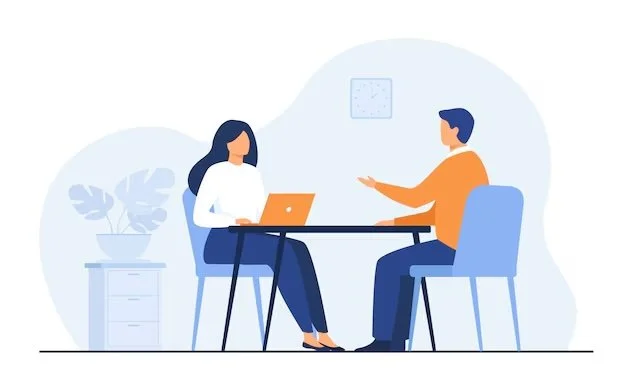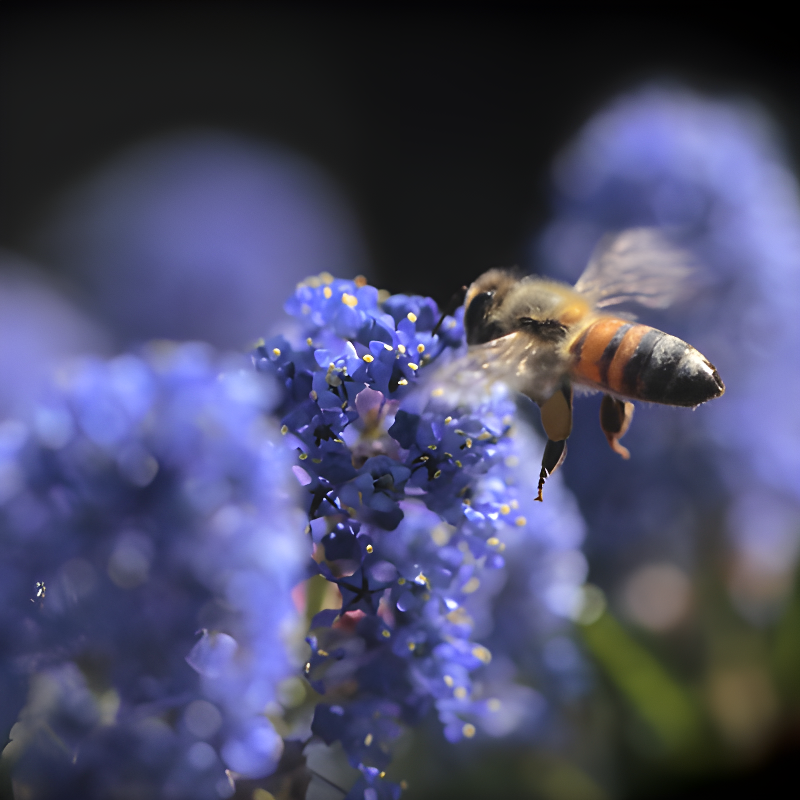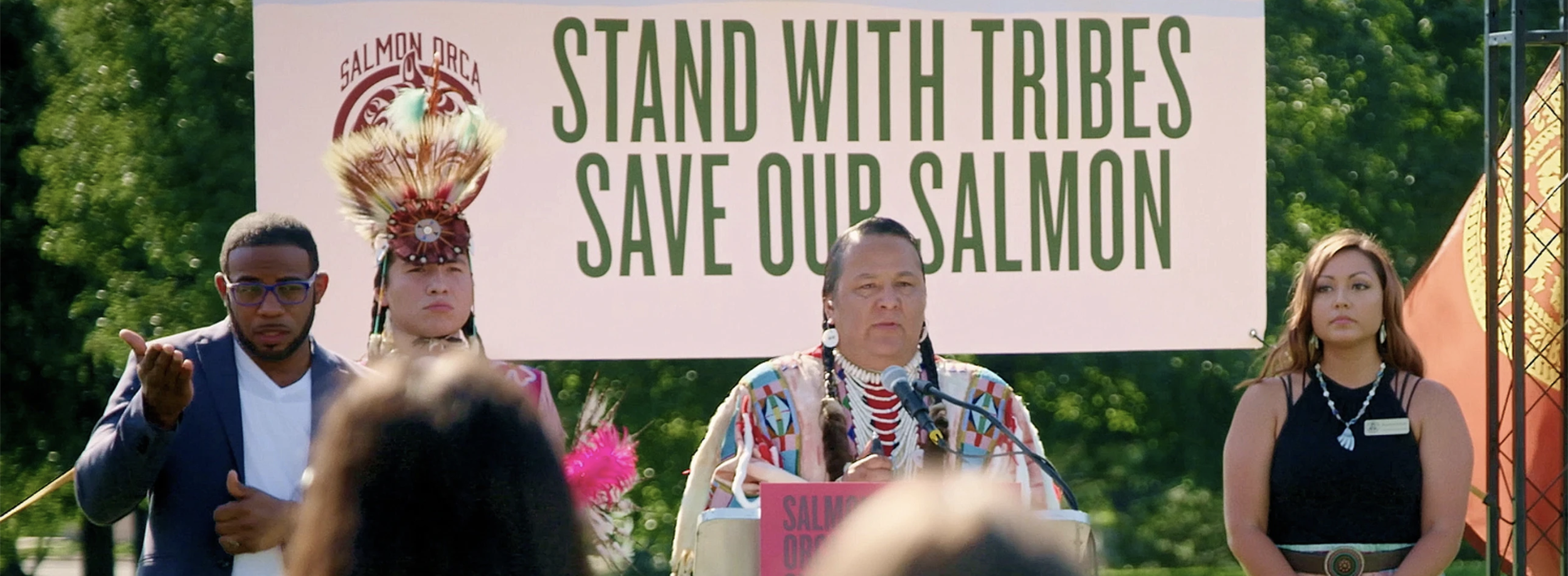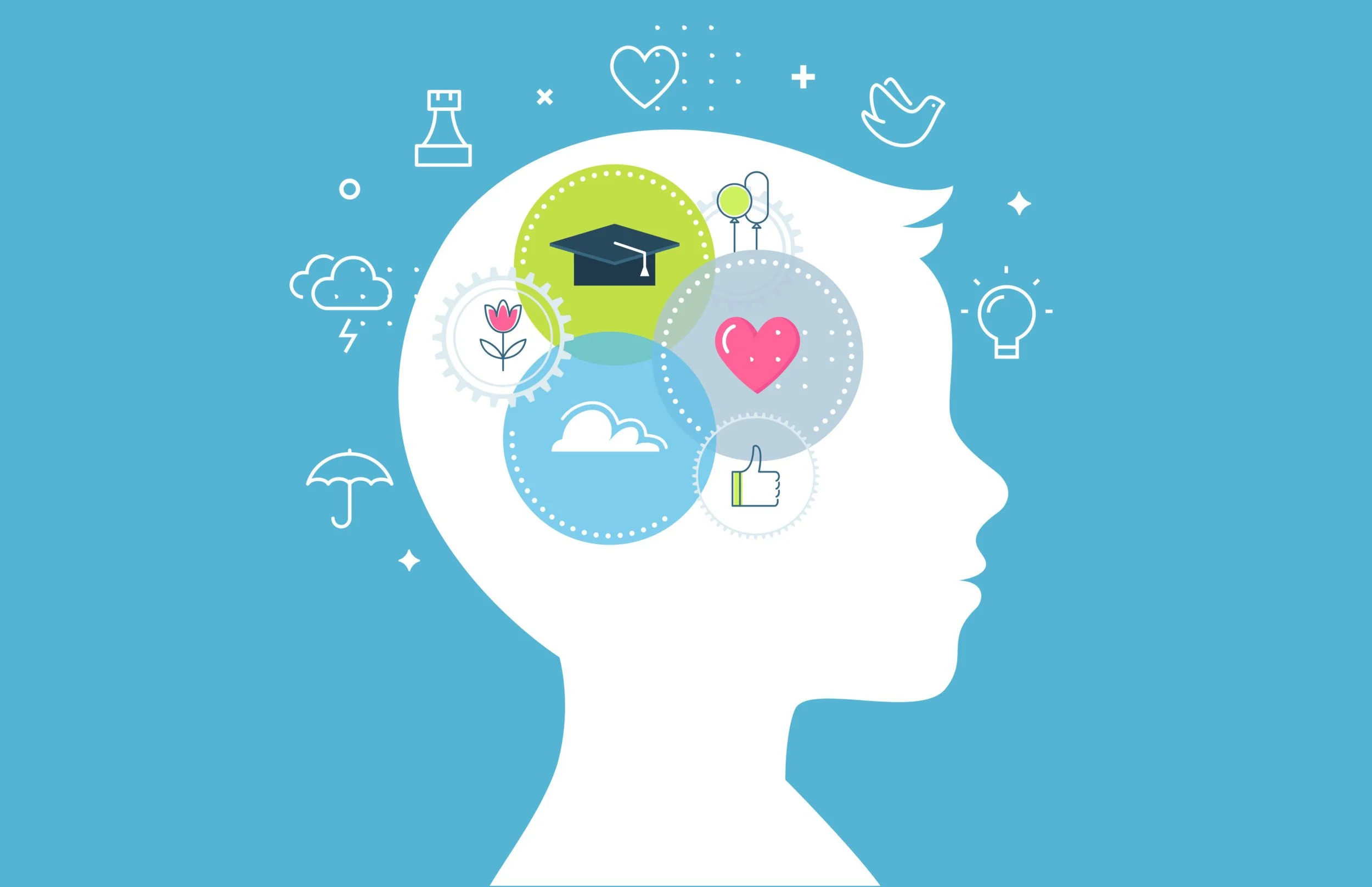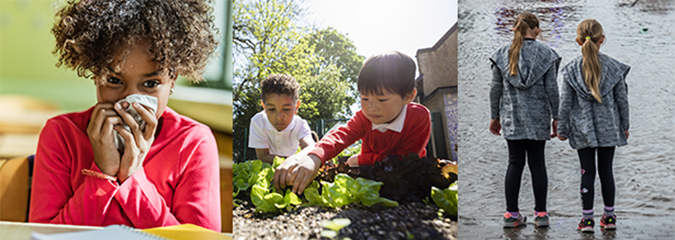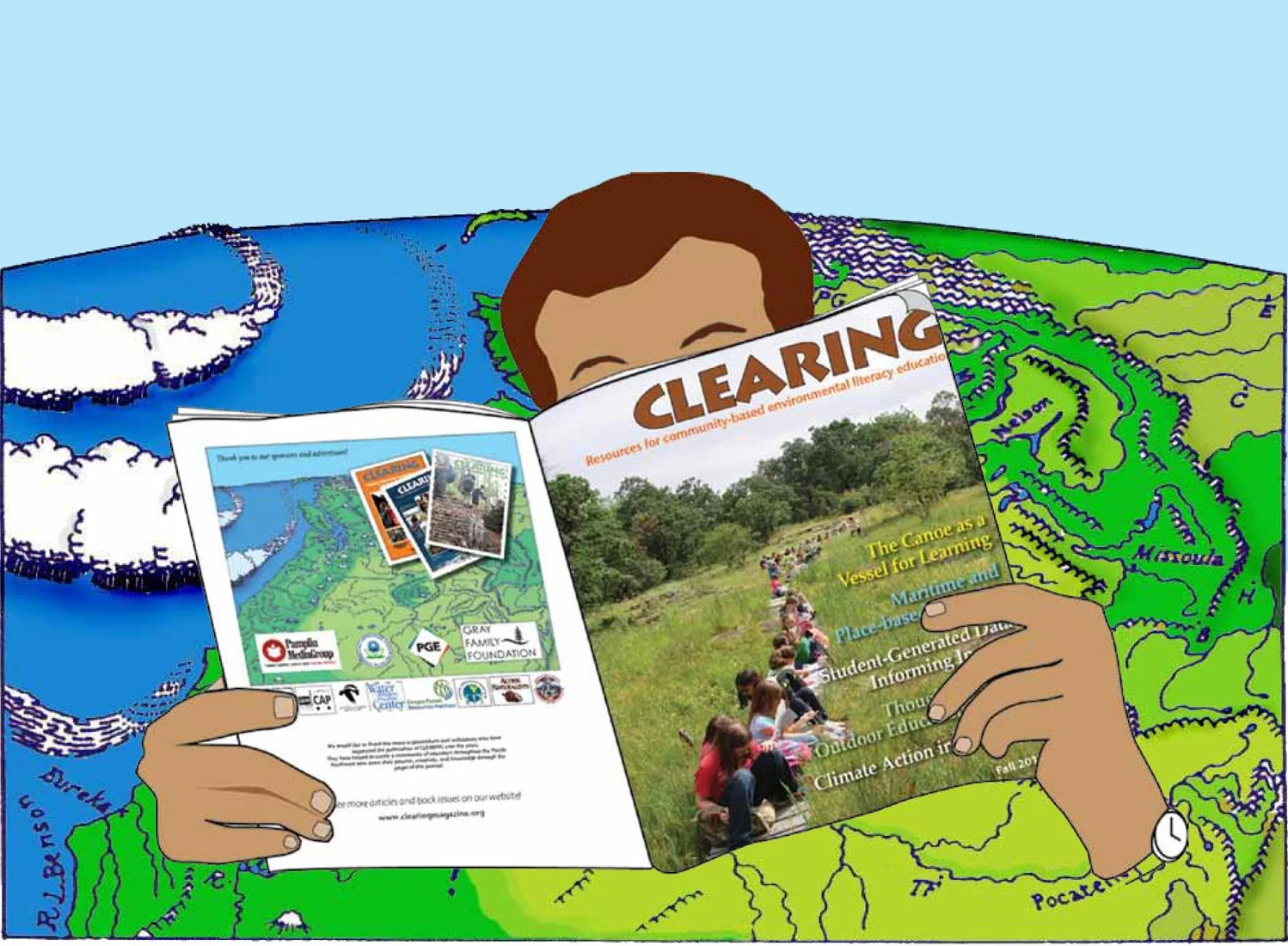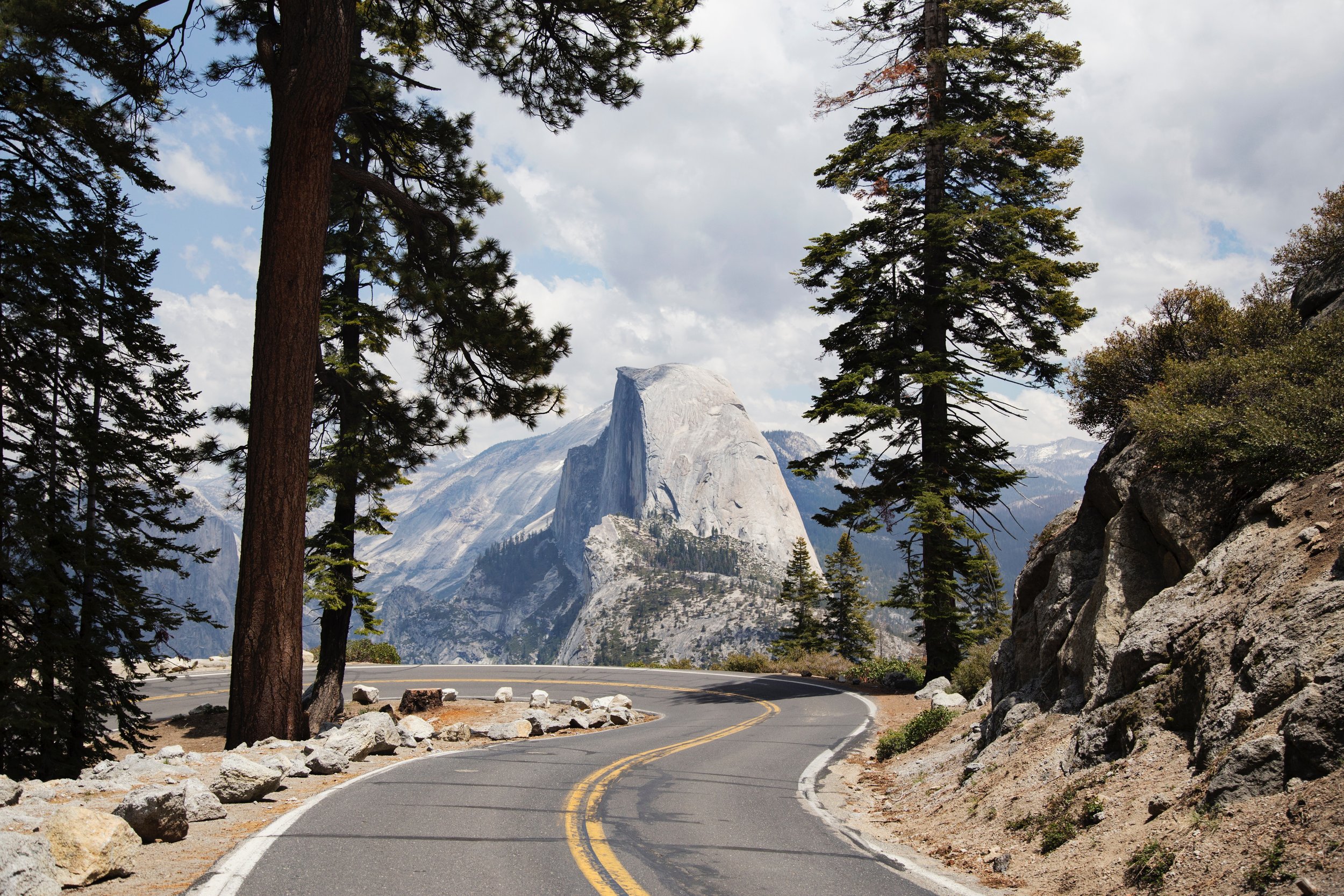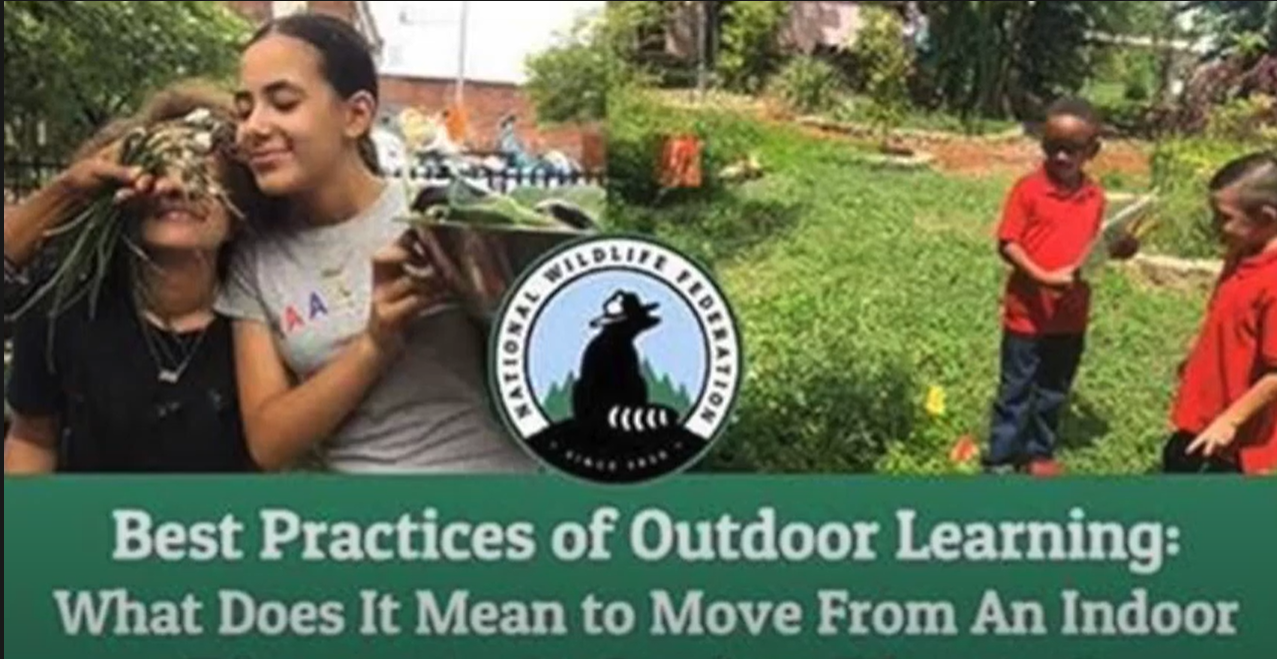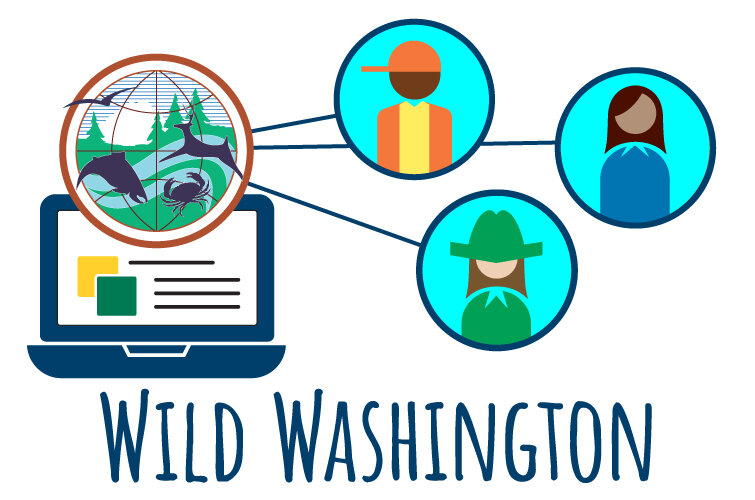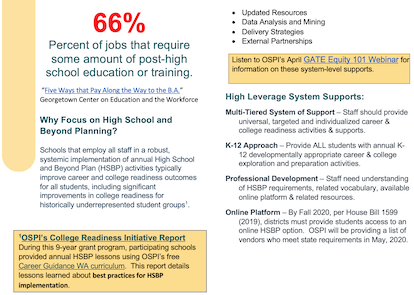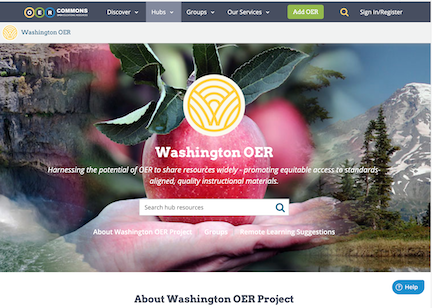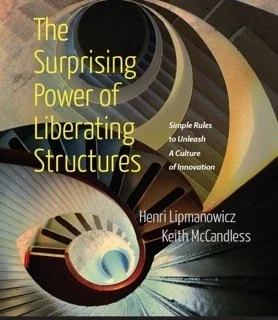Environment and Sustainability Resources
Washington State's Office of Superintendent of Public Instruction (OSPI) is offering support for educators and families during school closures, and hybrid learning models through their Novel Coronavirus Guidance and Resources Pages. Be sure to also visit the OSPI folder for Environment and Sustainability Education. E3 Washington is hosting pages with at-home and outside lessons:
Climate Action Venn Diagram
How you – specifically you – can help with climate solutions:
To find your meaningful and bespoke way to help address the climate crisis, draw your own Climate Action Venn Diagram.
What are you good at? What are your areas of expertise? What can you bring to the table? Think about your skills, resources, and networks—you have a lot to offer.
What work needs doing? Are there particular climate and justice solutions you want to focus on? Think about systemic changes and efforts that can be replicated or scaled. There are heaps of options.
What brings you joy? Or perhaps a better word is “satisfaction.” What gets you out of bed in the morning? Choose climate actions that energize and enliven you.
Learn more and watch creator, Ayanna Elizabeth Johnson, on TED.
Illegal interview questions that you should be looking out for
Many of the interview questions listed in this article are illegal to ask because they can enable very subtle forms of workplace discrimination. Remember to look out for these who applying for any job in Environmental and Sustainability Education (ESE).
Engage Students With Pollinator Activities for World Bee Day | Annually on May 20th
Engage students in learning about the vital role of bees and other pollinators with these engaging activities for World Bee Day. From exploring the bee life cycle to creating pollinator inventions, these hands-on projects cater to various grade levels and learning styles. Find Project Learning Tree’s blog post here.
U.S. EPA Environmental Education Program
This website provides information about EPA activities and programs that support environmental education, including:
1. Professional development
2. Youth and educator recognition
3. Grants
Environmental education increases public awareness and knowledge about environmental issues or problems. In doing so, it provides the public with the necessary skills to make informed decisions and take responsible action.
Visit https://www.epa.gov/education to learn more
Add Your Organization to Environmental Learning Map!
The Washington Office of Superintendent of Public Instruction (OSPI) Environmental and Sustainability Education program and E3 Washington, the state affiliate of the North American Association of Environmental Education (NAAEE) are collaborating to build a map of Environmental and Sustainability Education (ESE) providers and associated resources.
Upstream, Downriver (Film)
"Upstream, Downriver" takes viewers into the heart of the battle for water justice. Powerful stories with frontline community activists are interwoven with historical context about landmark regulations that significantly reduced water pollution in the U.S. but failed to serve disadvantaged communities that are hardest hit by today’s climate crisis. Learn more and watch the trailer here.
NOAA Planet Stewards
NOAA Planet Stewards provides all educators working with elementary through college-aged students access to opportunities and resources enabling them to build up scientifically literate individuals and communities, and preparing them to respond to environmental challenges.
NOAA Planet Stewards also supports educators’ efforts to implement hands-on action-based projects that conserve, restore, and protect human communities and natural resources from environmental challenges.
Academic Learning is Social and Emotional
OSPI has launched a new SEL (Social Emotional Learning) opportunity for Washington’s education professionals called Academic Learning is Social and Emotional. It is an online course that you can take at your own pace and earn 3 free clock hours. This self-paced, interactive course and supporting resources will help educators build their knowledge and skills to use SEL practices in their classroom instruction. This course will prepare educators to use SEL practices that focus on equity and supportive classroom environments to improve their students' classroom experiences. All three sections and the final quiz must be completed to receive clock hours.
Climate Change and Children’s Health and Well-Being in the United States Report
Our climate is changing, and the health and well-being of children will continue to be affected in many ways. Children are uniquely vulnerable to climate change due to a variety of physical, cognitive, behavioral, and social factors. Climate change-related impacts in childhood can have lifelong consequences due to effects on learning, physical health, chronic disease, and other complications.
Paper Craft Ideas for National Hispanic Heritage Month (Sept. 15-Oct. 15)
Make your own art, games, and instruments using recycled paper and cardboard!
Use these fun, hands-on kids craft ideas to highlight the diversity and beauty of Hispanic culture around the world and celebrate National Hispanic Heritage Month and Latino Conservation Week.
CLEARING Magazine
An online and print magazine for environmental literacy education in the Pacific Northwest and Cascadia bioregion. An E3 Washington member benefit is a copy of CLEARING magazine sent directly to your inbox. Interested in this member perk? Become a member today.
Cerebral Palsy Special Education
Education is one of the most important aspects of development for children with cerebral palsy. While public and private schools are the main cerebral palsy special education options, there are many other cerebral palsy education resources parents can choose from. With the proper resources, you can ensure your child thrives in the classroom and beyond. Learn more about navigating the special education system.
Environmental Education Virtual Field Trips for Nature Lovers
The Environmental Protection Agency (EPA) believes it's vital for every child to learn about the environment. The government agency says that quality environmental education allows students to understand issues facing the environment, participate in finding solutions to these issues, and begin to take action to do their part to make the environment better. Environmental education also requires students to research issues and form their own opinion based on their research. It should help students hone their critical thinking skills and also become more involved in the world around them. Luckily, there are many resources available to aid educators in providing high-quality environmental education. Click here for outdoor opportunities for families.
National Wildlife Federation’s Eco-Schools USA
EcoSchools U.S. offers a certification program for elementary through secondary schools that nurtures environmental learning and climate action. Our award-winning, curriculum-linked framework supports school communities as they assess, track, benchmark, and celebrate environmental excellence. We are the exclusive national operator of the EcoSchools program in the United States, and a member of the international network of EcoSchools, coordinated by the Foundation for Environmental Education.
Since Time Immemorial Curriculum-Spanish resources
The Office of Native Education is excited to announce that Spanish language lesson resources for the Since Time Immemorial tribal sovereignty and history curriculum are now available! Spanish language resources for most of the lessons, kindergarten through high school, are included as you navigate to lessons for your grade level. Please join us for any of our upcoming introductory webinars as we navigate through the curriculum website. The webinars are free. Additional information including webinar dates and registration information can be found on our STI Fall Training Schedule.
We appreciate your commitment and creativity to ensure educational opportunities for all of our students and wish you the best this school year. Please stay in touch with us as you share these lessons with your students. If you have questions, please contact me at laura.lynn@k12.wa.us or Joan Banker at joan.banker@k12.wa.us.
Saving the Southern Resident Killer Whales
Engaging students in real-world studies of endangered species without leaving them overwhelmed is incredibly challenging. NOAA’s unit on Southern Resident Orca Whales educates students on the cultural, economic, and environmental importance of this critically endangered species and gives them the tools to make meaningful changes in their school, community, and beyond.
Our Beautiful Planet
Our Beautiful Planet is a series of compelling 5-to-7-minute science films highlighting the cutting edge research that climate scientists are doing to solve some of the world’s most pressing issues.
NSTA and Kikim Media have partnered to launch these films and this collection of classroom-ready lesson plans that highlight the science and engineering practices scientists use to explain the phenomena of climate.
Winter Themed STEM Activities from
Project Learning Tree
Students are often fascinated with the drastic environmental changes throughout the seasons, especially if you live in a place where it snows during the winter. We often associate winter with dark nights, freezing temperatures, snow, and ice. In polar and temperate zones in the northern hemisphere, the winter season lasts from December through February. Parts of the U.S. with subtropical or tropical climates may also experience temperature differences during these months, but they may only have two seasons of “wet” and “dry” or “summer” and “winter.”
No matter what kind of weather you experience during the next couple months, consider adding these STEM activities to your winter-themed lesson plans.
Collectively, America's 230 million drivers have a great impact on themselves and on our nation: How much CO2 is emitted into the atmosphere that impacts our climate. How much fossil fuel energy is consumed. The air quality and health impact. The amount of money spent in fuel use, maintenance, and repairs. And how safe we are as drivers. Green Driving America is committed to helping drivers make transportation choices that will benefit the planet and themselves.
Themed around the state’s diverse flora and fauna, Wild Washington lessons are designed to equip K-12 students with the knowledge, social, and emotional skills needed to think critically, and problem solve around natural resource issues. Activities encourage students to explore various points of view and collaborate with others to find ways to move forward on real-world challenges.
The Department is working with the Office of Superintendent of Public Instruction to ensure lesson plans best meet state and national environmental and sustainability learning standards. Lessons are developed for educators to use in the classroom or in an outdoor learning setting, and also have modifications embedded for distance learning.
The National Wildlife Federation provides educators with easy-to-implement, trusted curriculum and activities that help inspire the next generation of environmental stewards.
Browse through lesson plans and webinars designed for educating students about wildlife biology, life sciences, conservation, and more. In addition to this collection, the National Wildlife Federation's Eco-Schools USA program offers educational pathways for educators in participating schools to utilize in the classroom.
Two beautiful galleries have been created to harness the power of art to engage the public on climate change. Educators guides are available to inspire you on how to use these resources in your classroom.
Visit Here:
With NOAA’s Data in the Classroom, students use real-time ocean data to explore today’s most pressing environmental issues, and develop problem-solving skills employed by scientists. Access online and classroom-ready curriculum activities with a scaled approach to learning and easy-to-use data exploration tools.
Whether it’s your first time or 100th time in the outdoors, an essentials checklist is a great way to make sure you’re prepared. This list is comprehensive, while not specifically geared toward educational settings or hiking with children. Please consider the needs of your entire group, the developmental appropriateness of some of these items, and use this list to make your own educators checklist.
Students from 7-12th grades are encouraged to prepare for their future careers. The High School & Beyond Plan revolves around three questions: Who am I?, What can I become?, and How do I become that?
The High School & Beyond Plan, a graduation requirement, helps students get the most out of high school and think about their future. Check out the tools for families, students as well as Green Job opportunities.
Consider also visiting Washington Career Bridge to expand your research.
This early childhood learning group under NAAEE, supports educators and parents who want to connect kids with their natural world. Subscribe to their newsletter to read a story that explores how nature-based educators can reconnect with their purpose while staying in touch with students, learn how a roaming forest school designed an insurance policy that meets their needs, stay up-to-date with the latest happenings in the field by reading a summary of our COVID-19 forums, browse jobs, and more!
Explore the North American Association for Environmental Education (NAAEE) EE Pro resources. Join for free. Check out upcoming professional development, group conversations and more. EE Pro features a host of past professional development webinars: Including Communicating during COVID-19- Tips and Strategies for the Environmental Education Community, Environmental Education and Indigenous Knowledge, and Fostering Collaborations and Engaging Communities using NAAEE’s Guidelines for Excellence.
Harnessing the potential of OER to share resources widely - promoting equitable access to standards-aligned, quality instructional materials. Be sure to also check out their rich collection of K12 Online Resources.
HIGH-QUALITY PROFESSIONAL DEVELOPMENT
Enhance your teaching skills and become comfortable teaching outdoors – in urban, suburban, or rural environments. Receive multi-disciplinary, hands-on lessons aligned with state and national academic standards. Put the materials to use right away in your own classroom, playground, or nature center.Project Learning Tree is offering 50% off on online workshops for at least April 2020.
Visit the PEI website for FieldSTEM resources, as well as the websites of our statewide partners ClimeTime. The PEI Teaching Resources section has teaching guides, English language arts performance tasks, storylines and more…
One example from this comprehensive list is Beetles Project. If you've ever wondered how to engage your kids anywhere outdoors, Beetles Project has resources and activities to help you. For example, Blending In and Standing Out is a great way to help your little scientists explore camouflage as they hunt for different colors as they walk.
Geographic Information Systems
Educators across our state are online teaching and learning skills to bring the classroom to students in new ways due to the governor's directive to "Stay Home and Stay Safe". Using geographic information systems (GIS) to teach environmental literacy provides a visual and place based emphasis on environmental topics that are critical in our communities. This citizen science approach integrates into other disciplines as well. One example of GIS projects is Trash Cache, where students use the software to build a web based survey and collect results about their communities waste habits. This project is part of the GeoProjects offered by Esri through ArcGIS online. If you're new to GIS, below are several other links to get you started in GIS education for your at home students, your classroom or your programs.
Do you teach geoscience online? Are you making a rapid transition to teaching geoscience online as a result of your institution's response to COVID-19? Online classroom environments offer unique ways of teaching and interacting. Online classrooms also have unique challenges and require specialized strategies for success. These challenges can be particularly acute for geoscience courses with laboratory and field components. Join a new community of geoscience educators focused on teaching their students in online environments. Ask questions, share experiences, and find resources that meet the needs unique to educators teaching geoscience online.
Justice, Equity, Diversity and Inclusion (JEDI) Teaching
Increase the equity in your classrooms or professional meetings with Liberating Structures. These habits make the most of every opportunity to meet and gather by using liberated facilitation techniques that do not perpetuate patriarchy and capitalism.
NAAEE partnered to contribute to the playbook to share the knowledge and experience of outdoor engagement and education champions to drive new, innovative ideas. The policy and investment recommendations reflect the understanding that the health of children and families, social and environmental justice, and the health of the natural world are inexorably linked. Playbook users will benefit from:
1. A framework of guiding principles for effective policy initiatives
2. Expertly curated research that helps make the case for youth outdoor engagement
3. A library of successful and emerging policy initiatives that connect kids with nature and support environmental education
4. Opportunities for cross sector leaders to connect.
Primary Sources: Environmental Journalism Sources
by Lisa Eschenbach
Maybe you want to read up on environmental issues in Washington State…or, maybe you’re looking for good articles for your students. I’ve got a few recommendations.
Northwest Indian Fisheries Commission
Check out the Quarterly Magazine for great short articles. Your students can read about current tribal fisheries and natural resource management. The Summer 2018 magazine had an article on the Elwha Dam restoration project, using drones to survey streams and trapping non-native green crabs.
Newsela
This site features news on a wide array of topics. Articles can be adjusted for different reading levels. I searched for Pacific Northwest and found articles on the Cascade Butterfly Project, plans to protect orca whales, and the geology of Mount St. Helens. You can also search by reading level or text level. They also have articles in Spanish.
Enjoy your reading.


